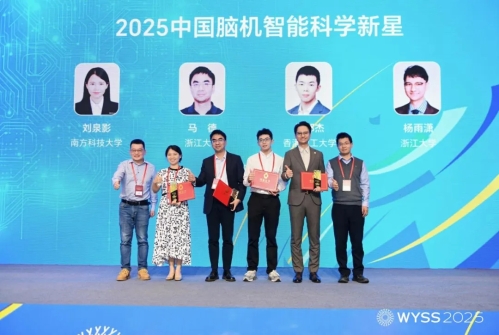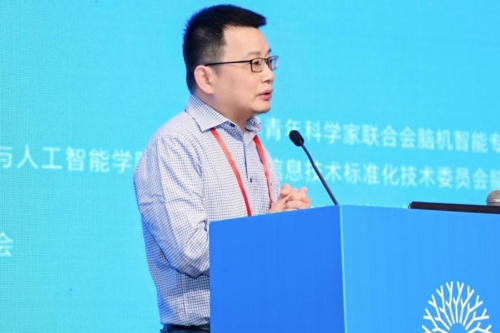Six scientists honored for brain-machine intelligence breakthroughs
Six young scientists were recognized at the first "China Brain-Machine Intelligence Rising Star Awards," held during the 2025 World Young Scientist Summit on Oct. 24 in Wenzhou, Zhejiang province.
The World Association of Young Scientists (WAYS) and the State Key Laboratory of Brain-Machine Intelligence at Zhejiang University jointly organized the award, honoring scientists under 40 who have made significant contributions to brain-inspired intelligence and brain-computer interfaces.

Pan Gang (1st L), professor at Zhejiang University, and Lu Chaoyang (1st R), chairperson of WAYS, pose with China Brain-Machine Intelligence Rising Star awardees at the 2025 World Young Scientist Summit in Wenzhou, Zhejiang province, Oct. 24, 2025. [Photo courtesy of the 2025 WYSS Organizing Committee]
Brain-inspired intelligence awards went to Ma De, associate professor of computer science at Zhejiang University; Wu Yujie, assistant professor of computing at Hong Kong Polytechnic University; and Yu Zhaofei, researcher at the Institute for Artificial Intelligence at Peking University.
In the brain-computer interface category, awards were given to Liu Quanying, associate professor of biomedical engineering at Southern University of Science and Technology; Yang Yuxiao, researcher at the State Key Laboratory of Brain-Machine Intelligence at Zhejiang University; and Zheng Weilong, associate professor of computer science at Shanghai Jiao Tong University.
Lu Chaoyang, chairperson of WAYS, presented the certificates at the ceremony.
Brain-machine intelligence leverages artificial intelligence and neuroscience to develop virtual brains modeled on biological systems, driving advances in brain-computer interfaces for clinical and computational uses.
Among the recipients, Liu Quanying develops multimodal neural signal processing algorithms and AI-driven twin-brain models to advance bidirectional brain-computer interfaces. Yang Yuxiao works on brain-computer interface systems for treating neurological and psychiatric disorders, while Zheng Weilong focuses on cognitive computing, affective computing and neuromorphic systems.
In brain-inspired computing, Ma De leads research on neuromorphic chips and neural network processors, including the development of the "Darwin" series brain-inspired chips at Zhejiang University. Wu Yujie explores brain cognition modeling and brain-inspired intelligence algorithms, while Yu Zhaofei studies neuromorphic and brain-inspired computation.

Pan Gang, professor at Zhejiang University and director of the State Key Laboratory of Brain-Machine Intelligence, speaks at the 2025 World Young Scientist Summit in Wenzhou, Zhejiang province, Oct. 24, 2025. [Photo courtesy of the 2025 WYSS Organizing Committee]
Pan Gang, professor at Zhejiang University and director of the State Key Laboratory of Brain-Machine Intelligence, said the awards align closely with the mission of the World Young Scientist Summit.
"The initiative aims to guide young researchers toward key frontier fields through targeted honors, motivating them to pursue breakthrough innovation in interdisciplinary areas," Pan said.
He noted this was the award's first edition but had already attracted strong academic attention, with numerous applications submitted nationwide. The selection process involved a thorough review of materials and collective deliberation to ensure professionalism and fairness.
By introducing two parallel tracks — brain-inspired intelligence and brain-computer interfaces — the evaluation respected each subfield's unique characteristics and provided a tailored platform for young scientists to showcase expertise. Three outstanding representatives were selected from each track after rigorous review.
Pan emphasized that as information technologies evolve rapidly, the deep engagement of young scientists has become increasingly vital.
"Young researchers possess dynamic thinking, quick learning ability and strong innovative drive," he said. "Their energy and adaptability are crucial forces behind sustained scientific progress."
He also called for systematic support for young talent through institutional innovation, resource allocation and platform building, ensuring promising scientists have the conditions and opportunities to become future leaders in frontier technologies.
Source: http://www.china.org.cn/2025-10/30/content_118150882.shtml
